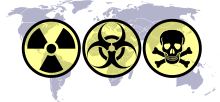Informatics Educational Institutions & Programs
Contents
| Antimatter |
|---|
 |
An antimatter weapon is a theoretically possible device using antimatter as a power source, a propellant, or an explosive for a weapon. Antimatter weapons are currently too costly and unreliable to be viable in warfare, as producing antimatter is enormously expensive (estimated at $6 billion for every 100 nanograms), the quantities of antimatter generated are very small, and current technology has great difficulty containing antimatter, which annihilates upon touching ordinary matter.[1]
The paramount advantage of such a theoretical weapon is that antimatter and matter collisions result in the entire sum of their mass energy equivalent being released as energy, which is at least two orders of magnitude greater than the energy release of the most efficient fusion weapons (100% vs 0.4-1%).[2] Annihilation requires and converts exactly equal masses of antimatter and matter by the collision which releases the entire mass-energy of both, which for 1 gram is ~9×1013 joules. Using the convention that 1 kiloton TNT equivalent = 4.184×1012 joules (or one trillion calories of energy), one half gram of antimatter reacting with one half gram of ordinary matter (one gram total) results in 21.5 kilotons-equivalent of energy (the same as the atomic bomb dropped on Nagasaki in 1945). [3]
Cost
As of 2004, the cost of producing one millionth of a gram of antimatter was estimated at US $60 billion.[1] By way of comparison, the cost of the Manhattan Project (to produce the first atomic bomb) is estimated at US$23 billion in 2007 prices.[4] As such, Hui Chen of Lawrence Livermore National Laboratory dismissed concerns about antimatter bombs in 2008 as "unrealistic".[5]
Antimatter catalyzed weapons
Antimatter-catalyzed nuclear pulse propulsion proposes the use of antimatter as a "trigger"[6] to initiate small nuclear explosions; the explosions provide thrust to a spacecraft. The same technology could theoretically be used to make very small and possibly "fission-free" (very low nuclear fallout) weapons (see pure fusion weapon).[7][8]
In popular culture
An antimatter weapon is a part of the plot of the Dan Brown book Angels & Demons and its film adaptation, where it is used in a plot to blow up the Vatican City.[9]
The Ground Zero expansion pack of the video game Quake II requires the protagonist to manufacture an Antimatter Bomb in the Munitions Plant to achieve the final objective.[citation needed]
References
- ^ a b "Air Force pursuing antimatter weapons / Program was touted publicly, then came official gag order". San Francisco Chronicle. 4 October 2004. Archived from the original on 29 December 2014. Retrieved 17 January 2015.
- ^ "Fusion Fuel". atomic rockets. Retrieved 2020-03-05.
- ^ "Antimatter Fuel". atomic rockets. Retrieved 2020-03-05.
- ^ "Manhattan Project". Archived from the original on 28 December 2014. Retrieved 17 January 2015.
- ^ "Laser technique produces bevy of antimatter". NBC News. 1 December 2008. Retrieved 24 May 2022.
- ^ "Antimatter weapons". cui.unige.ch. Archived from the original on 24 April 2013. Retrieved 4 May 2018.
- ^ Ramsey, Syed (12 May 2016). Tools of War: History of Weapons in Modern Times. Vij Books India Pvt Ltd. ISBN 9789386019837. Archived from the original on 16 August 2017. Retrieved 4 May 2018 – via Google Books.
- ^ "Details on antimatter triggered fusion bombs - NextBigFuture.com". nextbigfuture.com. 22 September 2015. Archived from the original on 22 April 2017. Retrieved 4 May 2018.
- ^ Delphine. "Angels & Demons: The Physics Behind The Movie (and The Book)". Wired. Retrieved 13 March 2021.
External links
- Spotlight on "Angels and Demons" – A discussion at CERN's public website on the viability of the use of antimatter for energy and weaponry
- "Air Force pursuing antimatter weapons: Program was touted publicly, then came official gag order"
- Page discussing the possibility of using antimatter as a trigger for a thermonuclear explosion
- Paper discussing the number of antiprotons required to ignite a thermonuclear weapon


















